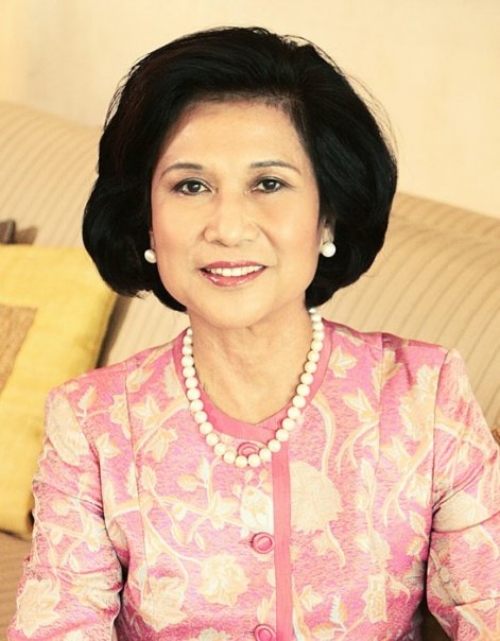ePahayagan Editor's Note: There's been a lot of interest in Loida Nicolas Lewis lately. We think it's important on reading once again a very well researched 2007 article on the leadership qualities of Ms. Nicolas Lewis and how she has developed into becoming a strong community leader.
HOW ONE FILIPINA WOMAN STEERED THE COURSE OF ONE OF THE MOST SUCCESSFUL BUSINESS ENTERPRISES IN AMERICA
From Cheerleader to Coach
By Regina Balane, Manila, December 2007
One blustery morning in December 1993, the board of directors at TLC Beatrice International Holdings Inc., a conglomerate of 64 companies in 31 countries, gathered for an emergency meeting at the firm's Manhattan offices. After six straight years of strong growth, the nation's largest African-American owned conglomerate was floundering. Europe, where most of its businesses were located, was in its worst recession in decades. The competition was gaining ground. Shareholders were getting impatient, urging the board to make the company public.
After that meeting, Loida Nicolas Lewis was elected to assume the position as TLC's chairman. With that announcement, a saga began, which, when it was over, would see a business empire go beyond its original ambition and give its investors more profit than they had ever expected.
Ironically, the announcement was greeted with skepticism. Only six years earlier, Loida Nicolas Lewis' late husband, former chair and CEO Reginald F. Lewis, had catapulted the company to the Black Enterprise Industrial/Service 100 List -- the first African-American owned enterprise to exceed the billion-dollar mark.
In a country as race conscious as the United States, Reginald Lewis had hurdled obstacles that would have discouraged other investors from minority communities. A relentless visionary, he was by 1991 in Forbes Magazine's list of 400 wealthiest Americans. By the time of his untimely death, in January 1993, TLC Beatrice, earning revenues of over $2.5 billion, had made him the wealthiest African-American in the country.
Loida Nicolas Lewis inducted to Asian Hall of Fame for 2007.
But his work had only just begun. He left behind his widow, Philippine-born Loida Nicolas Lewis, and two daughters, Leslie and Christina. How Loida Nicolas Lewis steered the company to achieve Reginald's vision -- and to go beyond everything he had imagined -- is a story in a way similar, yet remarkable and unique on its own.
"Reggie was my best tutor," demurs Loida, crediting her business savvy to the fact that she paid "one hundred percent attention" to her husband.
But Reynaldo P. Glover, a classmate from Harvard Law School who introduced them on a blind date 30 years ago, and TLC Beatrice's executive vice president and general counsel, says, "Loida was unassuming and laid back but educationally and intuitively brilliant. Reg was incredibly brilliant. They were both brilliant. They were soulmates. It was a terrific team."
Both super-achievers, their partnership set the stage for what was to be a series of record-breaking milestones in the history of African-Americans and Asian-Americans. Reginald graduated from Harvard Law School after being admitted without taking the entrance exam. Loida graduated from the University of the Philippines, passed the bar, and after settling down in New York, passed the New York State bar, the first Asian American woman to do so without having studied law in the U.S.
As working spouses, they pursued their law careers differently. She worked for Manhattan Legal Services, focusing on the problems of an underprivileged client base in East Harlem -- unemployment insurance, social security, discrimination, housing. Later, she worked as General Attorney for the Immigration and Naturalization Service for ten years. She left the INS in 1988, when her husband decided it would be better to manage the various companies owned by TLC Beatrice in Europe, and moved the entire family to Paris.
In her meetings with various business units in Europe and her speeches before organizations, universities and schools, Loida always stresses that Reginald encountered a string of setbacks at least three times before he finally met with success. After the third setback, she could see that he was close to giving up. A quiet presence, she always provided reserves of energy and strength for him. "I was the cheerleader, urging him on," she says.
Read the rest of the story here
Sources:
www.philpost.com
Philippine Post Magazine, August 2000
This article was based on two case studies written by Regina Balane under the supervision of Lorna Balina and Professor Ronald Chua, for the Asian Center for Entrepreneurship, Asian Institute of Management, Manila.
Reprinted in its entirety in Munting Nayon News Magazine-Issue 196, May 2006 with the permission of Ms. Loida Nicolas Lewis.
Photos courtesy of Ms. Loida Nicolas Lewis

